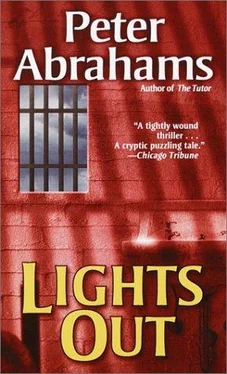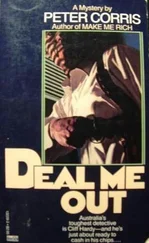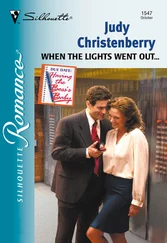Peter Abrahams - Lights Out
Здесь есть возможность читать онлайн «Peter Abrahams - Lights Out» весь текст электронной книги совершенно бесплатно (целиком полную версию без сокращений). В некоторых случаях можно слушать аудио, скачать через торрент в формате fb2 и присутствует краткое содержание. Год выпуска: 2002, ISBN: 2002, Издательство: Fawcett Books, Жанр: Триллер, на английском языке. Описание произведения, (предисловие) а так же отзывы посетителей доступны на портале библиотеки ЛибКат.
- Название:Lights Out
- Автор:
- Издательство:Fawcett Books
- Жанр:
- Год:2002
- ISBN:978-0345445780
- Рейтинг книги:4 / 5. Голосов: 1
-
Избранное:Добавить в избранное
- Отзывы:
-
Ваша оценка:
- 80
- 1
- 2
- 3
- 4
- 5
Lights Out: краткое содержание, описание и аннотация
Предлагаем к чтению аннотацию, описание, краткое содержание или предисловие (зависит от того, что написал сам автор книги «Lights Out»). Если вы не нашли необходимую информацию о книге — напишите в комментариях, мы постараемся отыскать её.
Lights Out — читать онлайн бесплатно полную книгу (весь текст) целиком
Ниже представлен текст книги, разбитый по страницам. Система сохранения места последней прочитанной страницы, позволяет с удобством читать онлайн бесплатно книгу «Lights Out», без необходимости каждый раз заново искать на чём Вы остановились. Поставьте закладку, и сможете в любой момент перейти на страницу, на которой закончили чтение.
Интервал:
Закладка:
“Is it too late to get into junk bonds?” Eddie said.
Jack smiled his smile. “They’re making a comeback already.” He had one more shot of Armagnac, then rose, stretching. “You can sleep on the pullout,” he said.
“I’m fine here.”
“Pullout’s more comfortable.” Jack went into the bedroom.
Eddie finished what was in his glass, put it down. His eyes rested on the envelope the bellman had brought. It wasn’t sealed. He peeked inside, saw a plane ticket, slipped it out. Jack was taking a return flight to Grand Cayman, first class.
“All set,” Jack called.
Eddie went into the bedroom. Jack was spreading a quilt on the pullout. He gave the pillows a little pat and went into the bathroom.
A few minutes later they were in their beds. The pullout was comfortable, but Eddie couldn’t sleep. He lay in it, feeling the Armagnac tingling inside him. He’d had too much, on top of too much the night before, and nothing for so many nights before that. The room began to spin, just a little. He watched it spin for a while, listening to Jack’s breathing. He knew that sound.
He spoke. “What happened to Fearless ?”
“Confiscated.” Jack replied immediately, wide-awake.
“How did Packer take that?”
Eddie heard a little laugh. “Brad? I don’t think he cared much by then. The bank owned the boat anyway.”
“It did?”
“Sure. Packer was just a nobody with a two-bit dream. The world’s full of Packers.”
Eddie had only met one, and Galleon Beach hadn’t seemed two-bit to him. The room spun a little more.
“Did you ever go back?” he said.
“Back where?”
“To Galleon Beach.”
“Why would I have done that?”
“It was a nice place.”
“It was a dump, Eddie. You’d be disappointed now. Some things only work when you’re young.”
Eddie knew that last part was true. That was what was killing him.
“Did JFK ever turn up?” he said.
Pause. “If he had, we’d have gotten you out.”
“He must be somewhere.”
“He could be dead. And even if he isn’t, does it matter anymore? You’re here. From now on things are going to be good for you. I’ll see to that.”
Eddie said nothing. He heard Jack roll over.
“Big day tomorrow,” Jack said. “Better get some sleep.”
A big day for you, maybe, Eddie thought. He stared at the ceiling. It was moving. He listened to Jack’s breathing, that same breathing he’d heard when they shared a bed in their little room.
“Do you remember Mom?” he said.
“A little.”
“What was she like?”
“Who knows?” There was a long silence before Jack said, “Christ, Eddie, we were living like shit the whole time.”
“No, we weren’t.”
“You’re wrong.”
But Eddie knew he was right, knew now what living like shit was about. There was another silence. It went on and on. Eddie occupied himself with the tingling of the Armagnac, Jack’s breathing, and the slowly spinning room. Time passed. Then Jack spoke once more, soft and gentle.
“Good night, Sir Wentworth,” he said.
That brought the mist to Eddie’s eyes, but of course no one could see, so it was almost all right. He pretended to be asleep.
Good night, One-Eye.
Outside: Day 4
17
Eddie awoke with a question on his mind: Did it matter if JFK was alive? was somewhere? He didn’t know the answer.
Jack was gone. He’d left a note on the coffee table, beside the bills he’d laid there the night before.
“Bro-here’s the card that opens the door and a pass for the health club. Did I mention the concierge? Hector? Don’t tip him-the fucker’s already taken care of. Back in a day or two. Get some clothes. Have a swim. Boogie. J.” At the bottom was a map showing the location of the health club, near Grand Central Station, and of Macy’s.
Eddie counted the money-$350-and left it where it was. He dressed in his sneakers and Prof’s sweatsuit, pocketed the note, the cards, and his Speedo, and started for the door. His hand was on the knob when he turned back, went into the bedroom, and opened the closet.
The suit Eddie had hung up for Jack was still there, between two pinstripes, one charcoal, one navy. Eddie checked the inside jacket pocket. The check for $230,000 was gone. He returned to the sitting room, came close to picking up the $350-it was just about equal to his take for the past fifteen years-and went out.
It was cold and rainy again, and everyone on the street looked pained. Not Eddie: just being outside was enough to make him happy. The rain fell in icy little pats on his bald head, like some exotic form of massage.
The Midtown Athletic and Racquet Club had everything Eddie’s hometown Y did not-a juice bar, fluffy towels, rows of the latest Nautilus, StairMaster, and LifeCycle machines, a cushioned track, men and women in fancy outfits, squash and tennis courts-everything but swimmers of Eddie’s class, or even Bobby Falardeau’s; or so he thought, watching the slow passage up and down the lanes. He dove into an empty one.
Right from the start he felt much better than he had in the hometown Y the day before; now he was a fluid being in a fluid medium. He swam for about an hour, just stretching out, listening to the water go by. He barely noticed when someone came up in the next lane, passed him with an easy fluttering kick. Eddie would have let him go, except he was curious about the ease of that kick.
He let loose a little, drew close on the next length, cruised half a body length behind, studying the other man’s technique. Not bad: he was swimming about fifteen stroke cycles per length, riding high in the water, keeping his head still; and he had that easy kick.
Eddie swam on, losing himself in the water, forgetting the other man. Forgetting, until the other man shot by him, passing him again. Shot by. And not because of an increase in arm speed. The other swimmer had decreased his arm speed, if anything; it was the underwater acceleration he’d speeded up.
Eddie did the same thing, felt himself surge. He was swimming beautifully, skimming, fluid and strong and fast. But the other swimmer drew farther and farther ahead. After three more laps, Eddie had lost sight of him. In ten more, he passed Eddie again. Eddie climbed out of the pool on his next touch.
The other man swam another lap, then fell back in the water, stretching. He looked up at Eddie and smiled. He was very young.
The young man climbed out, pulled on a Columbia sweatshirt. Columbia. Eddie didn’t remember it as a swimming power.
“You must have been really good,” the young man said. “Where’d you do your swimming?”
“Alcatraz,” Eddie replied. He’d learned something: It mattered whether JFK was alive, and where he was. It mattered a lot.
He went into the weight room. Eddie always started at the squat bar, but a woman in sheer tights and a pink leotard was there already. He waited until she finished her set and hoisted the bar back on the rack. She’d been lifting fifty pounds. Eddie added four hundred more, got under the bar, set his feet, got his grip, shouldered the bar, squatted, thrust himself back up. Usually he did three sets of ten, sometimes four. Today, feeling strong, he knew he could do five or even six. But after just that one lift, he lowered the bar back in the rack. He didn’t want to lift. Lifting was for making time go faster, a prison thing. Why would he want time to go faster now? He was free, free not to do something a little too much like breaking rocks in the hot sun. He walked away from the bar.
The woman in pink was chalking her hands and watching herself in the mirror at the same time; she was watching him too.
Читать дальшеИнтервал:
Закладка:
Похожие книги на «Lights Out»
Представляем Вашему вниманию похожие книги на «Lights Out» списком для выбора. Мы отобрали схожую по названию и смыслу литературу в надежде предоставить читателям больше вариантов отыскать новые, интересные, ещё непрочитанные произведения.
Обсуждение, отзывы о книге «Lights Out» и просто собственные мнения читателей. Оставьте ваши комментарии, напишите, что Вы думаете о произведении, его смысле или главных героях. Укажите что конкретно понравилось, а что нет, и почему Вы так считаете.












